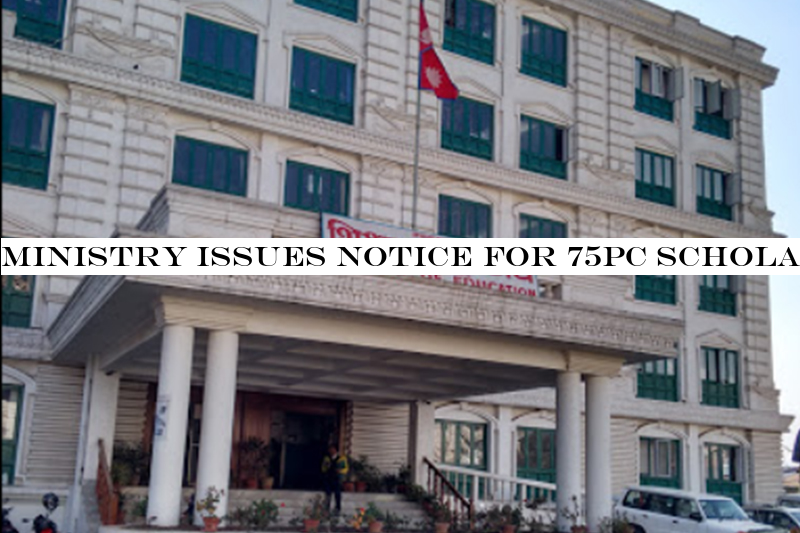Music
Trailers
DailyVideos
India
Pakistan
Afghanistan
Bangladesh
Srilanka
Nepal
Thailand
Iraq
Iran
Russia
Brazil
StockMarket
Business
CryptoCurrency
Technology
Startup
Trending Videos
Coupons
Football
Search
Download App in Playstore
Download App
Best Collections
Nepal
Kathmandu, November 4
Minister of Energy, Water Resources and Irrigation, Barshaman Pun, said the role of alternative energy was crucial to expanding access to modern energy in remote areas.
Addressing the 23rd anniversary of Alternative Energy Promotion Centre in Lalitpur today, Minister Pun said the contribution of energy sector was significant for achieving the national goal of ‘Prosperous Nepal, Happy Nepali&.
He stressed the need to take forward the campaign ‘Energy for All& in a result-oriented way, adding that the government had given priority to renewable energy.
The energy minister said that it was necessary to attract private sector investment in the renewable energy sector, adding that AEPC should develop itself as ‘Best Knowledge Centre&.
Saying energy good governance was the main challenge of the present, member of National Planning Commission Krishna Prasad Oli, said it was necessary to spread public awareness to save energy. He further said that alternative energy had become a reliable alternative in rural areas to fulfil the goal of Sustainable Development Goals& — access to energy to all by 2030.
Similarly, Executive Director of AEPC, Madhusudhan Adhikari, said that AEPC has been working to provide renewable energy technology to people in rural areas of the country.
The centre has been focusing on development and capacity increment of renewable energy and is at work to uplift the living standards of people through modern renewable energy technology, said the centredirector Nawaraj Dhakal. He also referred to the centrecontribution to economic, social and proportional development of the country.
On the occasion, 350 units of solar panels were distributed to residents of Mudkechula Rural Municipality in Dolpa district. Likewise, ‘Suprabidhi memorial renewable energy award& was presented to Darna Micro Hydel Cooperatives in micro-hydro, Sun Farmer Nepal in solar energy and Nepal Energy Development Company in bio-gas for their contribution to the development of renewable energy technology. The award carried a purse of Rs 25,000 each.
So far, the centre has donated 1.5 million improved ovens and 500,000 biogas plants across the country.
The post ‘Role of AEPC crucial to expand access to energy& appeared first on The Himalayan Times.
- Details
- Category: Nepal
Read more: ‘Role of AEPC crucial to expand access to energy’
Write comment (96 Comments)Kathmandu, November 4
The Ministry of Education, Science and Technology today issued a notice in the name of medical colleges affiliated to Tribhuvan University and its constituent colleges to provide 75 per cent scholarship quota in as many as 10 medical courses.

This image shows the Ministry of Education, Science and Technology in Singha Durbar, Kathmandu, in December, 2014. Photo courtesy: Niraj Bhusal via google Maps
Scholarship quota will be provided for medical courses such as Bachelors of Science in Nursing, Bachelors of Naval Science, Bachelors in Pharmacy, Bachelors in Optometry, Bachelors in Audiology and Speech Language Pathology, Bachelors in Public Health, BSc in Medical Laboratory Technology, Bachelors of Ayurvedic Medicine and Surgery and Perfusion Technology.
The notice also states that colleges affiliated to private universities such as Kathmandu University will also have to allocate 10 per cent scholarship quota for deserving students. But the medical colleges operated with foreign investment will have to allocate 20 per cent scholarship quota for students.
Interested students can apply for scholarship from November 4 to 18 this year. Interested candidates need to secure 50 per cent marks in the entrance test conducted by the concerned university or academy.
Students can log on to www.moest.gov.np to apply for the scholarship.
The post Ministry issues notice for 75pc scholarship quota appeared first on The Himalayan Times.
- Details
- Category: Nepal
Read more: Ministry issues notice for 75pc scholarship quota
Write comment (97 Comments) The Voice of Nepal Season 2 - 2019 - Episode 24 (Knockout) VideoLink: https://trailer.ecroaker.com/component/search/?videoid=6eLPyvkf6gI
The Voice of Nepal Season 2 - 2019 - Episode 24 (Knockout) VideoLink: https://trailer.ecroaker.com/component/search/?videoid=6eLPyvkf6gI- Details
- Category: Nepal
Read more: The Voice of Nepal Season 2 - 2019 - Episode 24 (Knockout)
Write comment (97 Comments)Romeo Juliet (2019) New Released Hindi Dubbed Full Movie | Jayam Ravi, Hansika Motwani, Poonam Bajwa
 Romeo Juliet (2019) New Released Hindi Dubbed Full Movie | Jayam Ravi, Hansika Motwani, Poonam Bajwa VideoLink: https://trailer.ecroaker.com/component/search/?videoid=GqGsBYHa7Zk
Romeo Juliet (2019) New Released Hindi Dubbed Full Movie | Jayam Ravi, Hansika Motwani, Poonam Bajwa VideoLink: https://trailer.ecroaker.com/component/search/?videoid=GqGsBYHa7Zk- Details
- Category: Nepal
Kathmandu, November 4
The government has said National Cyber Security Monitoring Centre, established three months ago on July 3, has started working effectively to alert the government bodies concerned about possible cyber security threats.
Ministry of Communications and Information Technology, issuing a press release today, said the NCSMC had been continuously monitoring the gateway router of the governmentintegrated data centre. It further said it had been monitoring the governmentofficial DNS servers, firewall application, governmentofficial mail server, protocol request, source IP address and various electronic services hosted through government integrated data centre.
The NCSMC was established with the aim of closely monitoring and foiling possible cyber attacks and increasing cyber security of government agencies. It is an authorised body for observing the governmentimportant sites, web applications and services.
The press release has sought nine points for enhancing cyber security in the country. It has also asked Information Technology Emergency Response Group under MoCIT to complete homework for the country to join the Asia Pacific Computer Emergency Response Team , an organisation that helps create safe and reliable cyber space in the Asia Pacific Region by next year. The ministry has also asked government bodies concerned to start working to formulate cyber security rules of government bodies as per their requirements. Furthermore, the ministry is also planning to appoint at least one cyber communication officer at each and every government office.
The press release states that the government should now establish a national cyber forensic centre to promote NCSMC as one of the world-class organisations.
Similarly, the ministry has proposed to build a Cyber Disaster Recovery Centre to retrieve important government documents and information that get destroyed or corrupted for some reasons. It further states that necessary regulations should be formulated to purchase advanced electronic devices from abroad in a bid to enhance cyber security system.
The post MoCIT to enhance cyber security of govt bodies appeared first on The Himalayan Times.
- Details
- Category: Nepal
Read more: MoCIT to enhance cyber security of govt bodies
Write comment (94 Comments)Kathmandu, November 4
Nephrologists have ruled out any possibility of immediate kidney re-transplantation of Prime Minister KP Sharma Oli since the level of antibodies is high in his blood.
&Kidney re-transplantation can&t be done in patients when they have high antibodies. Haemodialysis is the only option in such cases,& said Dr Santosh Gurung, Renal Transplant Physician at Sumeru Hospital. The re-transplantation of the kidney can&t take place when the level of antibody is high. The patient needs to wait until the antibodies are removed or lessened, he added.
&As the antibodies are toxic there are high chances of a new kidney being rejected,& said Dr Kalpana Shrestha, senior consultant nephrologist and head of Nephrology Department at Shahid Dharma Bhakta National Transplant Centre.
Before transplantation, the antibodies should be removed. This can be done either by using pills, injections and/or plasmapheresis.
Plasmapheresis is a process in which unhealthy plasma (with antibodies) is taken out and fresh plasma is transfused into the patient. The process is used when injections and pills used for removing antibodies do not work properly.
Antibodies (also called immunoglobulins) are kinds of proteins that help fight against diseases. A donated kidney has protein in it. The patientbody in which the kidney is transplanted will start producing antibodies harming the kidney he has received. Therefore, immuno-suppressant is given to the patient so that the protein released won&t harm the kidney transplanted.
Creatinine test is performed to find out whether a kidney is functioning well or not.
Creatinine is a waste product produced by muscles that is released via urine in healthy persons. Increased creatinine level in blood may mean that kidneys are not working as they should. The creatinine level should not exceed 1.4 mg/dL in males and 1.2 mg/dL in females. Haemodialysis is done when creatinine level rises above 6 mg/dL.
&If there is high creatinine level then renal biopsy is done to assure the level of antibodies in a kidney transplanted patient. Second kidney transplant is not recommended until the antibodies drop,& said Dr Rajendra Kumar Agrawal, chief consultant nephrologist.
Re-transplantation is possible only when there is proper dialysis, medication and normal health condition of the patient. It could take at least three months,& added Agrawal.
The transplanted kidney stops functioning because of the antibodies produced, side effects of the medicines the patient is consuming after transplantation; kidneys get affected because of increased number of dialysis, and severe infections, added Gurung.
If the antibodies are not removed then haemodialysis is the only option for the patient. The patient will have to undergo haemodialysis thrice a week. Depending upon his/her health condition, haemodialysis can be done twice a week. Each session of haemodialysis is completed in four hours, Shrestha added.
For a re-transplantation, the cause for failure of the first transplanted kidney should be detected. The outcome of re-transplantation is not so effective compared to the first transplant, the doctors said.
The PM was admitted to Grande International Hospital on Wednesday where he underwent two rounds of haemodialysis before being discharged on Thursday. The hospital said dialysis was conducted to lower the increased level of creatinine.
The post ‘Re-transplantation of kidney only after reduction of antibodies& appeared first on The Himalayan Times.
- Details
- Category: Nepal
Read more: ‘Re-transplantation of kidney only after reduction of antibodies’
Write comment (98 Comments)Page 1285 of 1646

 12
12





